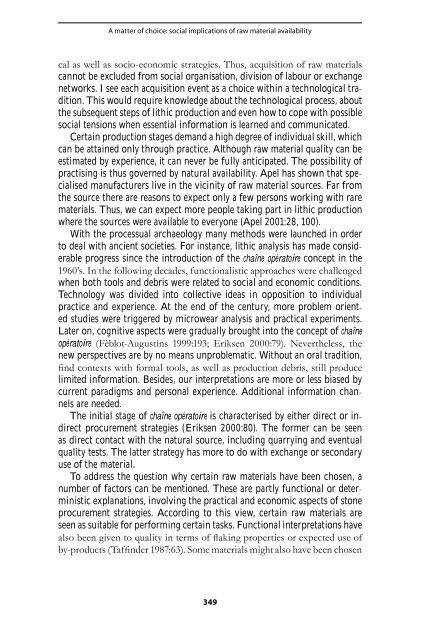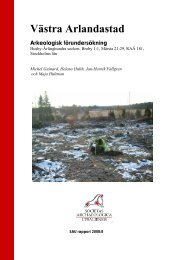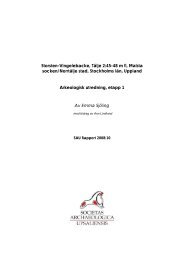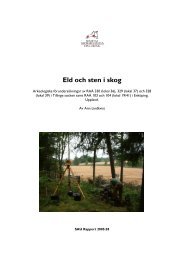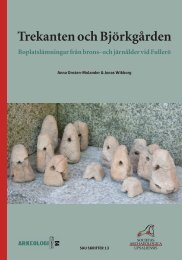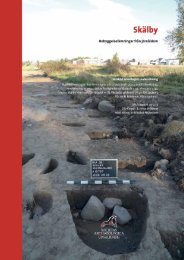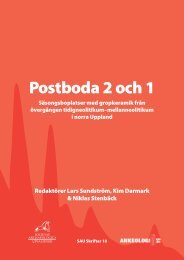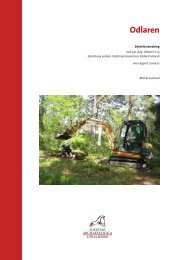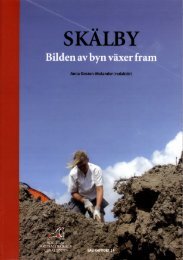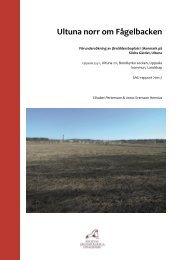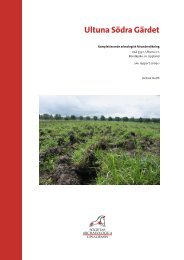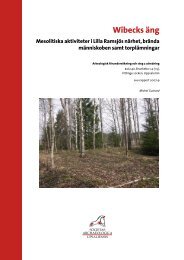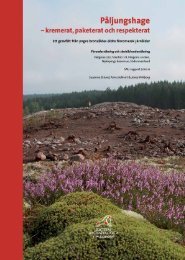- Page 2 and 3:
Skilled Production and Social Repro
- Page 4 and 5:
Contents Acknowledgements .........
- Page 6 and 7:
Kim Akerman High tech-low tech: lit
- Page 8 and 9:
Authors Kim Akerman 4 Dorset St Moo
- Page 10:
Introduction
- Page 13 and 14:
Jan Apel and Kjel Knutsson command
- Page 15 and 16:
Jan Apel and Kjel Knutsson Fig. 1.
- Page 17 and 18:
Jan Apel and Kjel Knutsson It was i
- Page 19 and 20:
Jan Apel and Kjel Knutsson how this
- Page 21 and 22:
Jan Apel and Kjel Knutsson dimensi
- Page 23 and 24:
Jan Apel and Kjel Knutsson ties. Ex
- Page 25 and 26:
Jan Apel and Kjel Knutsson valuable
- Page 27 and 28:
Marcia-Anne Dobres Fig. 1. Dominant
- Page 29 and 30:
• knowledge and know how Marcia-A
- Page 31 and 32:
Marcia-Anne Dobres Because material
- Page 33 and 34:
Marcia-Anne Dobres “theoretical
- Page 36:
Chapter 1 Experiments and Experienc
- Page 39 and 40:
Jacques Pelegrin et al. 1975, Kelt
- Page 41 and 42:
Jacques Pelegrin from a comparative
- Page 43 and 44:
Jacques Pelegrin Morphological char
- Page 45 and 46:
Jacques Pelegrin Fig. 2. Top: 4 rep
- Page 47 and 48:
Jacques Pelegrin 46
- Page 49 and 50:
Archaeological results Jacques Pele
- Page 51 and 52:
Jacques Pelegrin In one of the rich
- Page 53 and 54:
Jacques Pelegrin 52 Fig. 6. Blades
- Page 55 and 56:
Jacques Pelegrin length of 34.5 cm.
- Page 57 and 58:
Jacques Pelegrin The large blades f
- Page 59 and 60:
Jacques Pelegrin Large blades found
- Page 61 and 62:
Jacques Pelegrin a slightly concave
- Page 63 and 64:
Jacques Pelegrin panding in the dis
- Page 65 and 66:
Jacques Pelegrin piqueteur”; Gesl
- Page 67 and 68:
Jacques Pelegrin in prep.). It is
- Page 69 and 70:
Jacques Pelegrin pressure blades pr
- Page 71 and 72:
Hugo Nami core preparation was us
- Page 73 and 74:
Hugo Nami on the leg (Fig. 3a, 4a)
- Page 75 and 76:
Hugo Nami kes resulting in the Firs
- Page 77 and 78:
Hugo Nami During the entire core re
- Page 79 and 80:
Hugo Nami this reason, some archaeo
- Page 81 and 82:
Hugo Nami nodule morphology, mate
- Page 83 and 84:
Greg R. Nunn Archaeological evidenc
- Page 85 and 86:
Prior research Greg R. Nunn Prior r
- Page 87 and 88:
Greg R. Nunn Type 1C Attribute Tabl
- Page 89 and 90:
Type 1C Attribute Table Table 7. Da
- Page 91 and 92:
Greg R. Nunn Figure 6. Holding posi
- Page 93 and 94:
Greg R. Nunn 92 Figure 9. (a) Ishi
- Page 95 and 96:
Overview Greg R. Nunn The knapper m
- Page 97 and 98:
Greg R. Nunn explained in stage f
- Page 99 and 100:
Greg R. Nunn Sandstone slabs were p
- Page 101 and 102:
Greg R. Nunn the preform will need
- Page 103 and 104:
Greg R. Nunn if one pushes too har
- Page 105 and 106:
Greg R. Nunn 104 Figure 18. Stage s
- Page 107 and 108:
Greg R. Nunn of 5 cm, and the grea
- Page 109 and 110:
Greg R. Nunn apprentices. In additi
- Page 111 and 112:
Figure 24. Original Type 1C ground
- Page 113 and 114:
Greg R. Nunn After the handle and r
- Page 116 and 117:
Apel, J. & Knutsson, K., 2006. Skil
- Page 118 and 119:
Figure 3. Replica of Type I-C dagge
- Page 120 and 121:
Figure 9. The infamous Skatelöv da
- Page 122 and 123:
Figure 14. Original Stage 4 Seconda
- Page 124 and 125:
Neolithic Danish Daggers: an experi
- Page 126 and 127:
Figure 28. Side view of same prefor
- Page 128 and 129:
Figure 34. Finished Stage 5 Final P
- Page 130 and 131:
Neolithic Danish Daggers: an experi
- Page 132 and 133:
Figure 48. Author grinding dagger r
- Page 134 and 135:
Neolithic Danish Daggers: an experi
- Page 136 and 137:
Neolithic Danish Daggers: an experi
- Page 138:
Notes Neolithic Danish Daggers: an
- Page 141 and 142:
Hugo Nami Archaeological background
- Page 143 and 144:
Experimental study Hugo Nami Most
- Page 145 and 146:
Stage 1. Obtaining the blank Hugo N
- Page 147 and 148:
Figure 8. Stage 2 made on a tabular
- Page 149 and 150:
Hugo Nami the platforms by formin
- Page 151 and 152:
Final considerations Hugo Nami I co
- Page 154 and 155:
Apel, J. & Knutsson, K., 2006. Skil
- Page 156 and 157:
Figure 1. The archaeologist under a
- Page 158 and 159:
A genealogy of reflexivity: the ski
- Page 160 and 161:
A genealogy of reflexivity: the ski
- Page 162 and 163:
A genealogy of reflexivity: the ski
- Page 164 and 165:
A genealogy of reflexivity: the ski
- Page 166 and 167:
A genealogy of reflexivity: the ski
- Page 168 and 169:
A genealogy of reflexivity: the ski
- Page 170 and 171:
A genealogy of reflexivity: the ski
- Page 172 and 173:
A genealogy of reflexivity: the ski
- Page 174 and 175:
A genealogy of reflexivity: the ski
- Page 176 and 177:
A genealogy of reflexivity: the ski
- Page 178 and 179:
A genealogy of reflexivity: the ski
- Page 180 and 181:
A genealogy of reflexivity: the ski
- Page 182 and 183:
A genealogy of reflexivity: the ski
- Page 184 and 185:
A genealogy of reflexivity: the ski
- Page 186 and 187:
A genealogy of reflexivity: the ski
- Page 188 and 189:
Apel, J. & Knutsson, K., 2006. Skil
- Page 190 and 191:
Continuity of place: actions and na
- Page 192 and 193:
Continuity of place: actions and na
- Page 194 and 195:
Continuity of place: actions and na
- Page 196 and 197:
Continuity of place: actions and na
- Page 198 and 199:
Continuity of place: actions and na
- Page 200 and 201:
Continuity of place: actions and na
- Page 202 and 203:
Ritual deposits Continuity of place
- Page 204 and 205:
Continuity of place: actions and na
- Page 206 and 207:
Continuity of place: actions and na
- Page 208 and 209:
Apel, J. & Knutsson, K., 2006. Skil
- Page 210 and 211:
Skill and experimental archaeology
- Page 212 and 213:
Skill and experimental archaeology
- Page 214 and 215:
Skill and experimental archaeology
- Page 216 and 217:
Figure 4. Relationship between theo
- Page 218 and 219:
Skill and experimental archaeology
- Page 220 and 221:
Apel, J. & Knutsson, K., 2006. Skil
- Page 222 and 223:
Knowledge and know-how in the Oldow
- Page 224 and 225:
Knowledge and know-how in the Oldow
- Page 226 and 227:
Knowledge and know-how in the Oldow
- Page 228 and 229:
Knowledge and know-how in the Oldow
- Page 230 and 231:
Cores Knowledge and know-how in the
- Page 232 and 233:
Knowledge and know-how in the Oldow
- Page 234 and 235:
Knowledge and know-how in the Oldow
- Page 236 and 237:
Knowledge and know-how in the Oldow
- Page 238 and 239:
Knowledge and know-how in the Oldow
- Page 240 and 241:
Discussion Knowledge and know-how i
- Page 242 and 243:
Knowledge and know-how in the Oldow
- Page 244:
Knowledge and know-how in the Oldow
- Page 247 and 248:
Tuija Rankama, Mikael A. Manninen,
- Page 249 and 250:
Tuija Rankama, Mikael A. Manninen,
- Page 251 and 252:
Tuija Rankama, Mikael A. Manninen,
- Page 253 and 254:
Tuija Rankama, Mikael A. Manninen,
- Page 255 and 256:
Tuija Rankama, Mikael A. Manninen,
- Page 257 and 258:
Tuija Rankama, Mikael A. Manninen,
- Page 259 and 260:
Tuija Rankama, Mikael A. Manninen,
- Page 261 and 262:
Conclusion Tuija Rankama, Mikael A.
- Page 264 and 265:
Apel, J. & Knutsson, K., 2006. Skil
- Page 266 and 267:
Skill and the question of blade cra
- Page 268 and 269:
Skill and the question of blade cra
- Page 270 and 271:
Skill and the question of blade cra
- Page 272 and 273:
Skill and the question of blade cra
- Page 274 and 275:
Skill and the question of blade cra
- Page 276:
Skill and the question of blade cra
- Page 279 and 280:
Mikkel Sørensen perspective A lit
- Page 281 and 282:
Mikkel Sørensen regular and irregu
- Page 283 and 284:
Mikkel Sørensen The new dynamic te
- Page 285 and 286:
Mikkel Sørensen within the last ph
- Page 287 and 288:
Mikkel Sørensen blades are, du
- Page 289 and 290:
Mikkel Sørensen included removals
- Page 291 and 292:
Mikkel Sørensen to this, this auth
- Page 293 and 294:
Mikkel Sørensen Explaining the tec
- Page 295 and 296:
Mikkel Sørensen historic events an
- Page 297 and 298:
Acknowledgements Mikkel Sørensen T
- Page 300 and 301: Apel, J. & Knutsson, K., 2006. Skil
- Page 302 and 303: Manifesting microliths: insights an
- Page 304 and 305: Manifesting microliths: insights an
- Page 306 and 307: Manifesting microliths: insights an
- Page 308 and 309: Manifesting microliths: insights an
- Page 310 and 311: Manifesting microliths: insights an
- Page 312 and 313: Manifesting microliths: insights an
- Page 314 and 315: Manifesting microliths: insights an
- Page 316 and 317: Apel, J. & Knutsson, K., 2006. Skil
- Page 318 and 319: Some remarks on contacts between La
- Page 320 and 321: Some remarks on contacts between La
- Page 322: Some remarks on contacts between La
- Page 325 and 326: Kim Akerman recognise six or seven
- Page 327 and 328: Kim Akerman Antiquity of human occu
- Page 329 and 330: Kim Akerman head and lashing the t
- Page 331 and 332: Kim Akerman Jarung and ilera were c
- Page 333 and 334: Kim Akerman describe margin tre
- Page 335 and 336: Kim Akerman es) would bring herds
- Page 337 and 338: Kim Akerman lashing the stone elem
- Page 339 and 340: Kim Akerman calyptus trees. Once th
- Page 341 and 342: Kim Akerman end protrudes to form a
- Page 343 and 344: Kim Akerman tural factors that ensu
- Page 345 and 346: Kim Akerman more obtuse than the
- Page 347 and 348: Kim Akerman in the paper. L-R: sil
- Page 349: Per Falkenström • Implications w
- Page 353 and 354: Per Falkenström amounts of stone,
- Page 355 and 356: Per Falkenström Raw materials and
- Page 357 and 358: Per Falkenström Similar to in sout
- Page 359 and 360: Per Falkenström such as kinship
- Page 362 and 363: Apel, J. & Knutsson, K., 2006. Skil
- Page 364 and 365: Ground stone hammer axes in Sweden
- Page 366 and 367: Ground stone hammer axes in Sweden
- Page 368 and 369: Ground stone hammer axes in Sweden
- Page 370 and 371: Ground stone hammer axes in Sweden
- Page 372 and 373: Ground stone hammer axes in Sweden
- Page 374 and 375: Ground stone hammer axes in Sweden
- Page 376 and 377: Ground stone hammer axes in Sweden
- Page 378 and 379: Ground stone hammer axes in Sweden
- Page 380 and 381: Ground stone hammer axes in Sweden
- Page 382 and 383: Ground stone hammer axes in Sweden
- Page 384 and 385: Ground stone hammer axes in Sweden
- Page 386: Ground stone hammer axes in Sweden
- Page 389 and 390: Witold Migal 1983) (Figs. 6, 7) and
- Page 391 and 392: Witold Migal Figure 4. Core from th
- Page 393 and 394: Witold Migal is a 42 cm long core w
- Page 395 and 396: Witold Migal Figure 7b. One core fo
- Page 397 and 398: Witold Migal with a wooden pole lev
- Page 399 and 400: Witold Migal Among others, Russian
- Page 401 and 402:
Kim Darmark 63f.). However, the pre
- Page 403 and 404:
Kim Darmark The amount of splinter
- Page 405 and 406:
100% 80% 60% 40% 20% 0% 49 10 13 27
- Page 407 and 408:
Kim Darmark hammerstones retain a r
- Page 409 and 410:
Kim Darmark Jettböle differs from
- Page 411 and 412:
Skilled Production and Social Repro
- Page 413 and 414:
Skilled Production and Social Repro
- Page 415 and 416:
Skilled Production and Social Repro
- Page 417 and 418:
Skilled Production and Social Repro
- Page 419 and 420:
Skilled Production and Social Repro
- Page 421 and 422:
Skilled Production and Social Repro
- Page 423 and 424:
Skilled Production and Social Repro
- Page 425 and 426:
Skilled Production and Social Repro
- Page 427 and 428:
Skilled Production and Social Repro
- Page 429 and 430:
Skilled Production and Social Repro
- Page 431 and 432:
Skilled Production and Social Repro
- Page 433 and 434:
Skilled Production and Social Repro
- Page 435 and 436:
Skilled Production and Social Repro
- Page 437 and 438:
Skilled Production and Social Repro
- Page 439 and 440:
Skilled Production and Social Repro
- Page 441 and 442:
Skilled Production and Social Repro
- Page 443 and 444:
Skilled Production and Social Repro
- Page 445 and 446:
Skilled Production and Social Repro
- Page 447 and 448:
Skilled Production and Social Repro
- Page 449 and 450:
Skilled Production and Social Repro
- Page 451 and 452:
Skilled Production and Social Repro
- Page 453 and 454:
Skilled Production and Social Repro
- Page 455:
Skilled production and Social Repro


